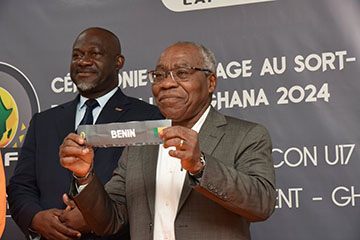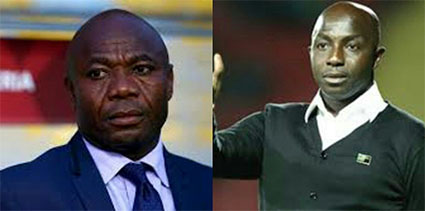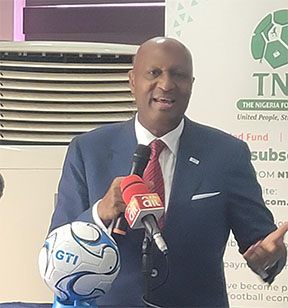Nigerian Football
They Got it Wrong! NFF Not Founded In 1945
BY KUNLE SOLAJA.
The phrase: “Founded 1945” adorns the circular emblem of the Nigeria Football Federation (NFF). It stems from the fallacy that the organisation was established in 1945 even though no one could verify the precise date the presumed event took place that year.
No fact exists to back the dateless foundation except that the present day’s AITEO Cup started as Governor’s Cup that year. The Governor’s Cup had since changed to numerous names such as the Challenge Cup, Coca-Cola FA Cup and later Federation Cup till last season.
However, the link of the establishment of the Governor’s Cup and the founding of what is the NFF today is yet another erroneous belief in Nigeria’s football history.
Documented evidences point to the fact that the Governor’s Cup was not a product of the then NFA but that of the Lagos and Districts Amateur Football Association (LDAFA) which is today known as the Lagos FA, the oldest football association in Nigeria having been established in 1930 by Henry A. Potter, the same man who founded the NFA three years later.
The LDAFA which already had two other competitions – War Memorial Cup and European Cup – called for entries for the maiden edition of the Governor’s Cup. This can be found in the Daily Times edition of July 30, 1945.
As at the time, football competitions in Lagos were along racial lines. The War Memorial Cup was open to all affiliated clubs and scratch teams affiliated to the LDAFA while the European Cup was for all affiliated clubs of Europeans living in Lagos.
In both instances, the teams paid entry fees of five shillings. The War Memorial Cup later changed to Mulford Memorial Cup to honour the man who did so much for football in Nigeria that he was affectionately called “Baba Eko” (respected elder of Lagos). He was one of the pioneers of the NFA.
Another fact to show that the Governor’s Cup was the creation of the present day Lagos FA can be gleaned from a write up in the Daily Times publication of November 6, 1946 in which the LDAFA Chairman, Frank G. Lloyd wrote that the Governor’s Cup presented in 1945 was in the custody of the LDAFA.
“This season (1946), as an experiment, invitations were issued by the LDAFA to numerous provincial associations. It is also intended that the Nigeria Football Association shall shortly be re-organised in order that it may provide a more effective vehicle for the experience gained in Lagos to provincial association.”
This proves that as at November 1946, the NFA was not organising the Governor’s Cup. It was in 1947, when Captain D.H. Holley became the LDAFA boss and also emerged the chairman of the NFA that the NFA began to organise the Governor’s Cup competition. At the annual general meeting of the LDAFA on February 26, 1948, Captain Holley announced the transfer of the Governor’s Cup to the NFA.
Another pointer that the NFF was not founded in 1945 was the fact that it was first affiliated to The FA in England as far back as 1934. A non-existing body could not have been registered by reputable FA in England.
As stated earlier in another story, the first secretary of the NFA, Joseph Mead told the first AGM in 1934 that an application had been forwarded to The Football Association (The FA) in London for affiliation.
That led to another opening in the search for the true origin of what is now known as the NFF. A letter which was dispatched to The Football Association in England by this reporter was responded to by David Berber, the Public Affairs Officer at The FA.
He wrote in part: “I can advise that the name of the Nigeria Football Association first appeared in the FA Handbook for the season 1938-39 in the list of our affiliated associations. The NFA secretary at that time was F.B Mulford, with a Lagos address.”
That is an indication that the body had existed before 1945. Then a visit to the offices of the oldest football body in the world which will, on October 26, celebrate its 154th anniversary resulted in more startling revelations.
The minutes of the meeting of the council of The FA (England) held at 22 Lancaster Gate London on June 4, 1934 revealed that under item number 10, “The Nigeria Football Association was admitted to membership under Rule 5 of the Rules of the Association”.
The affiliation of the NFA as an associated member of The FA was reported in the Nigeria Daily Times edition of September 14, 1934.
Like FIFA founded in 1904, the NFA went into coma during the World War II. After the 1934 first AGM, the NFA was in a state of inactivity, especially in the period of the World War II when all attention was on the Essential Work Order, according to a Daily Times report of November 8, 1947.
It was 14 years after formation, that the NFA was reconstituted. Even then, that cannot be taken as foundation date just as FIFA, founded in 1904, but inactive for 26 years till the 1930 inaugural World Cup did not take the commencement of its competition as foundation year.
This is also the case with The FA founded in 1863 but had its first FA Cup match eight years later in 1871, yet did not claim that as its foundation year.
The first time the phrase “Founded 1945” crept into the NFA letter head in correspondence with FIFA was a letter dated March 17, 1981 announcing a new executive led by Co. Mike Okwechime. Before then, all correspondences with FIFA had just the affiliation year.
.
- The first time the phrase “Founded 1945” first appear in a correspondence with FIFA was in this March 17, 1981 letter conveying the list of a new board of the NFA led by Col. Mike Okwechime. – Copy obtained from FIFA sources.
Nigerian Football
Nigeria face tough defence as Burkina Faso lie in wait at U17 WAFU B AFCON qualifiers

Defending champions Nigeria have been handed a difficult path to the 2025 U17 Africa Cup of Nations finals after being drawn in the same group as Burkina Faso for next month’s WAFU B qualifying tournament in Ghana.
The Golden Eaglets, who won the last edition of the regional championship in 2022, will also face Togo and Niger in Group B of the competition which runs from 15-28 May.
Hosts Ghana find themselves in Group A alongside Cote d’Ivoire and Benin in a tough-looking section of the competition to be played in Accra.
The draw was conducted by 1970s Ivorian football legends Kobenan Kouman and Die Foneye at the Ivorian FA headquarters in Abidjan on Friday.
Nigeria claimed their WAFU B U17 AFCON title by defeating Burkina Faso 2-1 in the regional final in Ghana two years ago.
However, they will need to overcome some familiar foes if they are to defend their crown and with the Burkina Faso finishing third at the last TotalEnergies U17 Africa Cup of Nations, some exciting matches are expected.
Arch-rivals Nigeria and Ghana are among the two favourites and could meet in the final in Accra on 28 May, should they top their respective groups and make it through the semi-finals.
Ghana also have pedigree at this level, having the World Cup in 1991 and 1995 as they bid to reach the U17 AFCON finals on home soil.
The top two teams from the WAFU B tournament will qualify for next year’s U17 Africa Cup of Nations.
Groups:
Group A: Ghana, Cote d’Ivoire, Benin
Group B: Burkina Faso, Nigeria, Togo, Niger.
Nigerian Football
Former Nigeria international, Onye recommends Amuneke-Siasia combo for Super Eagles

BY KUNLE SOLAJA.
Kingsley Onye, the left sided defender who was a member of the first Flying Eagles side to have a podium finish at the U-20 World Cup has suggested the employment of Emmanuel Amuneke as the coach of the Super Eagles.
He wants him to be assisted by Samson Siasia when the ban on the latter lapses in August. Alternatively, Onye pointed to Sylvanus Okpala as alternative to Siasia.
The Super Eagles are in dare need for a head coach as the clock ticks down to the Match day 4 and 5 of the 2026 World Cup qualifiers in which the team is trailing at the third position.
The two matches in early June are crucial for the Super Eagles to bounce back into reckoning as the team can not afford to drop any of the available six points in the duels with South Africa at home and away to Benin.
From this Monday, it is 41 days to the potentially challenging tie with South Africa, but the Nigerian national team has been without a coach since the expiration of the contract of Portugal’s Jose Peseiro shortly after the Africa Cup of Nations in Cote d’Ivoire.
Without mincing words, Onye remarked: “Emmanuel Amuneke is the right man for the job of the coach of Super Eagles. He has been there before.
“He tasted it and had been fantastic with the Nigeria youth team, the U-17 by assisting Manu Garba to win the U17 World Cup in 2013 and as head coach, led the Golden Eaglets to win the cup again in 2015.”
Onye who played for the Enugu Rangers in Nigeria before venturing to the UK but had his career scuppered by freak injury pointed out that the solution to Super Eagles’ technical deficiency is the appointment of an indigenous coach and that Amuneke is the man.
In buttressing his assertion, he declared: “As a senior team coach, Amuneke qualified a long standing absentee team, Tanzania for the 2019 Africa Cup of Nations.
“His record as a player is also very impressive. He played and won with the Super Eagles, the AFCON 1994. He played at the Olympic Games and was also the first Nigerian to score two goals at the World Cup.
“He has played at the African Games and also for top clubs in the continent as he was a member of the Egyptian giants, Zamalek. In Europe, he played for Sporting Clube de Portugal and then Barcelona before injury ended his playing career.”
Onye also looked at the personality of Amuneke in recommending him for the Super Eagles job.
His record as a player is also very impressive. He played and won with the Super Eagles, the AFCON 1994. He played at the Olympic Games and was also the first Nigerian to score two goals at the World Cup.
He has played at the African Games and also for top clubs in the continent as he was a member of the Egyptian giants, Zamalek. In Europe, he played for Sporting Clube de Portugal and then Barcelona before injury ended his playing career.
Nigerian Football
GTI enlarges coast…spreads from League fund-raising to Federation Cup

BY KUNLE SOLAJA.
Strategic partners of the Nigeria Football Federation, GTI Asset Management and Trust Ltd has expanded their scope of operations from fund sourcing for the Nigeria Premier League to adding the responsibility of getting the national cup competition back into its glamorous days.
The MD of the company, Abubakar Lawal at the unveiling a revamped Federation Cup which has been renamed President Federation Cup remarked that his company decided to take a bold step to support the national cup.
“I am the happiest man today, he said in the opening remark of the rebranding of the national cup through signing of Memorandum of Understanding with the Ministry of Sports and the NFF.
“Our company is also strategically involved in ensuring that the President Federation Cup is given necessary attention to thrive using The Nigeria Football Fund (TNFF) as our vehicle to actualise this dream.
“Therefore, it is our vision that the oldest domestic football event becomes one of the best organised football events in the world in no distant future.”
-

 Nigerian Football1 week ago
Nigerian Football1 week agoRemo Stars add fuel to the fire as title chase turns East – West battle
-

 UEFA Champions League1 week ago
UEFA Champions League1 week agoNigerians among Leverkusen’s African quintetin historic Bundesliga triumph
-

 CAF Confederation Cup1 day ago
CAF Confederation Cup1 day agoNigeria’s Samson Adamu signs Algeria’s USM match forfeiture
-

 Nigerian Football1 week ago
Nigerian Football1 week agoRangers tenaciously hold on at Nigeria League top position
-

 CAF Confederation Cup2 days ago
CAF Confederation Cup2 days agoBREAKING! CAF awards abandoned Confederation Cup semi-finals to Morocco’s RS Berkane
-

 Nigerian Football1 week ago
Nigerian Football1 week agoHeartland back to their homeland as they host Shooting Stars
-

 OBITUARY1 week ago
OBITUARY1 week agoAnother Germany World Cup winner dies
-

 FEDERATION CUP7 days ago
FEDERATION CUP7 days agoBREAKING! Federation Cup acquires presidential nomenclature…7th name since inception




